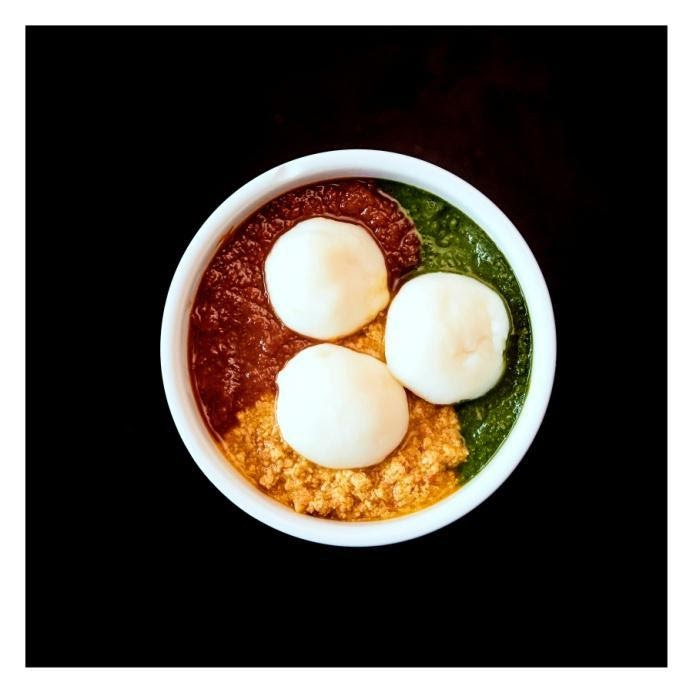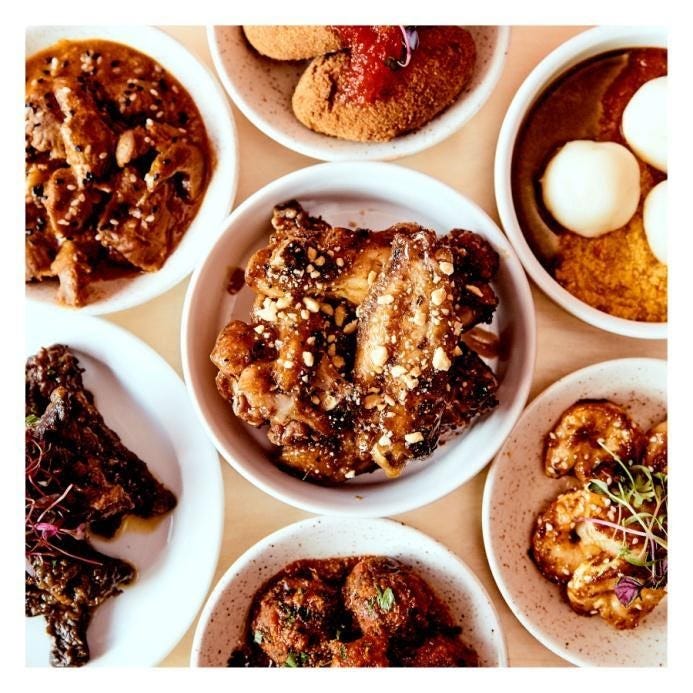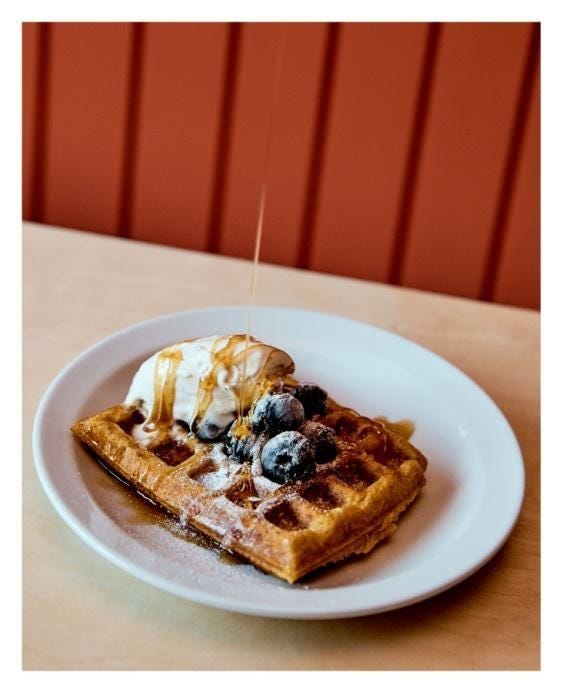Vittles 3.9 - London's Nigerian Food Shops
Shopping in Little Lagos, by Emeka Frederick
If you have been enjoying Vittles, then you can contribute to its upkeep by subscribing via Patreon https://www.patreon.com/user?u=32064286, which ensures all contributors are paid. As Patreon charges on the 1st of each month, this is the best time to donate as you will be paying for a whole month’s worth of articles. All donations are very much appreciated.
“On each Voyager space probe there exists a golden record with recordings of the human voice and music from around the planet encoded within it: Gould playing Bach, The Rite of Spring, a raga sung by Kesarbai Kerkar, Johnny B Goode. Here's a thought experiment: if humanity could preserve food in the same way, what would it send? What would we want these dishes to say about how we ate, about the means we undertook to survive? If we sent ten dishes, you would have to say egusi soup should be among them, not just because it is a great dish but it is one of the few great dishes to be made primarily from seeds — powerful repositories of Earth's memory so often discarded during the cooking process. Nigerian soups, which often use seeds (egusi, ogbono), are are what writer Yemisi Aribisala calls "some of the best kept secrets in the world". And yet, Westerners can often find them challenging. Not that they aren't beautiful: a good egusi soup is a stunning dish, a balm of warm amber, the texture simultaneously fluffy from the ground seeds and oily from the scarlet palm oil which oozes through it like a lava lamp. It is usually mixed with leafy vegetables and assorted meat or seafood which then become anonymous in egusi's depths. In response to a friend who had it on a plane to Lagos and didn't know what it was, Aribisala wonders if it "could have done with a makeover".
Enter Chuku's, who after a four year long incubation on the pop-up circuit, have finally arrived fully formed in Tottenham. I’m calling it: their take on egusi soup is going to be a breakout dish. In it they have achieved that makeover while losing none of it's egusi-ness. The bowl is divided into three like a traffic-light pie-chart, red for tomato, yellow for egusi, green for spinach. Instead of a big ball of pounded yam on the side, each partition contains a little golf ball's worth. The dish seems perfectly ergonomic — shareable, vegetarian, cute, and, most importantly, introduces what egusi is all about to the first timer, holding their hand through the process without appearing to. Emeka and Ifeyinwa Frederick, who own Chuku's, want to break down the barriers that exist between Nigerian food and the wider London food culture; in those balls of yam it's possible to see three little stepping stones fording the divide, to a future where egusi soup is reeled off the tongue by Londoners as easily as ramen, laksa and pho.”
I wrote this exactly three months ago in a capsule review of Chuku’s that never got published. This lockdown has been cruel to restaurants but it has been particularly cruel to Chuku’s, which had just opened and was finding its stride. It was due a review by Jimi Famurewa that very week, and I’m sure it would have got a national one eventually (it would have been the first West African restaurant in the UK to ever receive one — which is a discussion for another time). Some people in the media might call the emergence of Nigerian food in places like Chuku’s a “trend”, but this is their excuse for not noticing it until someone told them to. The major difference between those last three soups and egusi, apart from the noodles, is that egusi has been eaten by London communities — at home and in restaurants — for many decades. Not as your food-hall lunch or at a new trendy spot in Soho, but as a lived experience for the thousands of British Nigerians who call London home.
Integral to this lived experience are the shops which sell the ingredients that the West African cuisines are based around — fresh produce like yams, plantains and scotch bonnets, the fufu and various flours you can find at most south London corner shops who stock them as an economic no-brainer, and then the specialist ingredients like stockfish, that egusi and the incredible ferments whose musky base notes resound through the stews and soups. In today’s newsletter by Chuku’s Emeka Frederick, he guides us through a West African store that supplies him personally and professionally, making the case that if the restaurant is closed — for now — then maybe we can recreate some of it at home. And perhaps, when this is over, the rest of London will be ready once again for the real deal.
Shopping in Little Lagos, by Emeka Frederick
Want to ‘dine out in little Lagos’? That’s how The Evening Standard announced our restaurant Chuku’s, when we first opened. Well, first we have to shop at little Lagos. That's where the adventure begins – at our Nigerian food supplier. Originally we were directed to shops in South London, but with our restaurant based north of the river, we found one closer to home in Barking, Abi Global Foods, which also caters for wholesale customers.
Just like any bustling Lagosian food market, the first thing that hits you when you walk into the shop are the smells. Number one: the iru (fermented locust beans) by the entrance. It is kept in a refrigerator but the pungent aroma still percolates through the glass door, overpowering the sealant. Don’t be deceived by its odour though, this condiment is an umami powerhouse and the secret agent in ayamase, a rich green pepper stew.
Number two: the dried, smoked crayfish, used to deepen the layers of flavours in many traditional Nigerian soups, including my favourite egusi (melon seed) whose quintessential ingredient also sits proud by the entrance, in a gold-backed plastic wrapper. You have two options with egusi: whole or ground. My mum always recommends I choose the former. But in truth I’m a lazy chef, so why would I not get it pre-ground when I’m just going to have to go back to the kitchen and grind it myself anyway. It’s the same price after all, at £7 a kilogram. The price always sticks in my head, as it’s more expensive than most meats. Such is the delicacy of this protein-rich seed for the Nigerian diaspora.
Speaking of meat, number three: the assorted meats, which are found in the chest freezers close by. To clarify – when a Nigerian says assorted meats, we mean offal – pomo (cow skin), honeycomb shaki (beef tripe) and cow foot. I just don’t want you to make the same mistake at a restaurant as I did on one of my first trips back home to Nigeria as a kid, and expect your order of assorted meat to mean a platter of chicken wings, beef strips and lamb chops. Nine year old Emeka was bitterly disappointed. This shopping trip on the outskirts of East London is a delight though. Just stepping in through the doors, I have been whisked straight back.
“Good afternoon, ma”, I greet the madam who runs the shop floor, orchestrating proceedings from her station at the till point. She knows me now. I’m the ‘English boy’. I’m just hoping she doesn’t test me by greeting me in Yoruba, the language spoken by the most populous ethnic group amongst London’s Nigerian diaspora. If she does I’ll first highlight that I’m Igbo before she switches languages and greets me in my mother tongue. At which point I’ll have to admit I don’t speak that either. “Aunty, I’m learning-o,” I’ll protest, as she raises her eyebrows and simultaneously purses her lips in a way that fondly reminds me of my Nnenne [mother’s mother].
“Oga, how far?” [“Chief, how are you?”], I salute the security guard. We shake hands and click fingers (this is pre-COVID-19). I give him a formal salutation, for his stature is that of someone who could have been in the army – not the podgy ticket collector type. He is the only one who seems to be oblivious to the latest Burna Boy track drifting over the airwaves. The rest of the floor staff are all grooving, gyrating and bopping, as they stack the shelves and package up boxes. It’s a vibe! I collect my trolley and – on beat – weave my way through my fellow customers clustering by the till point, waiting to pay. There may not seem to be a queue but there is an order, and woe betide you if you try to cut in, as the madam sees all.
I drive my trolley into the aisles stacked high with imported goods. First up is the drinks. I have my fingers crossed that the traffic chaos at Apapa port – the cause of month-long supply chain delays – has eased and that Star beer, our crisp lager of choice, brewed and bottled in Lagos, will be in plentiful supply. Today I am in luck. There’s even freshly imported Nigerian Guinness, Foreign Extra Stout, brewed with extra hops and, especially for the Nigerian market, with maize and sorghum for a unique bitter taste. Finally, the sweetest nectar of all: Palm Wine. Tapped from an oil palm, raffia palm or date palm tree – depending on the local region in which the wine is produced – this is literally a drink fit for kings. Produced in varying alcoholic strengths and even sometimes distilled into a gin-like liquor, this sweet wine, cloudy and white in colour, is drunk in many a Nigerian home at social get-togethers. It’s also used ceremonially, where the king, chief or family elder would always have the privilege of drinking it first. At Chuku’s, we have a palm wine and coconut rum cocktail called The Obi, taking its name from the Igbo aristocratic title, as we pay homage to the elders and chieftains.
Next up are the snacks: groundnuts, plantain crisps and chin chin, a bite-sized biscuit-like snack. I’m suddenly whisked back to a Lagos go-slow (traffic jam), caught in rush hour on Third Mainland Bridge heading back from the Island to the Mainland. What should be a 45 minute journey could now quite conceivably be three hours – and will probably be at least two, so I better get comfortable. I ask the taxi driver to tune into The Beat 99.9 FM, put on my sunglasses and recline in my chair, Iulled by the sweet Afrobeats. All of sudden, a traffic hawker catches my eye in the wing mirror. I roll down my window sharp, “Elo, elo. Sir, excuse me.” He comes running over to display his wares. This is a proper drive-thru. I select a bottle of groundnut in a recycled Gordons gin bottle, a pack of plantain crisps and Pure Bliss biscuits. Just what I need to see me through the journey. All is well! Snapping back to reality, I lift several boxes of Sweet Yellow and Sweet Chilli Plantain Crisps into my trolley, a couple of towers of chin chin for our Chin Chin Cheesecake and bottled groundnuts to sprinkle onto our Kuli Kuli Caramel Chicken.
Fresh plantain – that versatile “gift from the ‘food gods’” which is most certainly not “an edgy sweet potato” – we’ve got that too. I dream regularly about the barbecue roasted plantain (boli) which had me salivating in Balogun market on Lagos Island. My streetscape memory of the market woman roasting plantain over the open grill now adorns our restaurant shutter. For my great Uncle, there is nothing better than having it boiled in order to appreciate all of plantain’s nutritious health benefits and diabetes-controlling properties. At Chuku’s, our house preference is for fried plantain (dodo) but we also created our signature Plantain Waffle dessert to celebrate this godly food gift. There’s also fresh okra for all the hipsters who want to push up the price when I just want to use it to make my beloved fisherman soup, seafood okra. There’s fresh scotch bonnet peppers too for those spice-lovers – which to debunk a popular myth is not all Nigerians. My younger sister Ifeyinwa is testament to that fact. She has a low tolerance for pepper and even finds too hot our fruity Scotch Bonnet Jam, which tops our ojojo (smoked mackerel and yam croquettes). My elder sister and I love them, and the endorphins they induces. Speaking of yam, there are huge boxes of puna (white) yams – “the king of crops” as described by novelist Chinua Achebe. Traditionally they were harvested by men and a symbol of wealth and masculinity. At the restaurant, we’ll finesse them into another innovative dessert, a rich Chocolate Yam Brownie.
The final item on my list is suya – not the skewered meat dish but the mixed spice sometimes referred to by the same name. Also known as yaji, the ingredients are: dried ginger, cloves, red chillies, Cameroon pepper, salt and, the pièce de résistance, kuli kuli – defatted groundnut paste. Just listing them all takes me back to a day trip to Mile 12 Market, one of the biggest marketplaces in Lagos. I went for the simple pleasure of grinding up my own fresh suya. Having bought my ingredients from various market sellers, a madam then led me to a small, dimly lit hut. The boys inside were surprised to have visitors, let alone one who looked like a tourist in a bucket hat. I asked them if I could have a go on their grinding machines. They kindly obliged, pulling on the motor to start it up. As it vibrated like a pneumatic drill, I tried and failed to carefully pour in my spices into the top of the grinder. Instead, plumes of pepper spewed into the air, choking my lungs and stinging my eyes. It was exhilarating! Through watery eyes, I watched as the machine spat out fresh suya pepper into the collection bowl. Back in the outskirts of East London, there’s less ceremony as the “magic gold” - the name one of my chefs gave it - is preciously weighed out of the hessian sack. The salesman keeps going until the scales tip 20 kilograms – we’ll need all of that at Chuku’s for one of our best sellers, Suya Meatballs.
With that my Lagosian shopping adventure draws to close. I steer my trolley – still on beat – back towards the checkout. I’ve somehow spent over two hours here and am now running late to get back to the restaurant. As I impatiently wait my turn in the orderly non-queue, my eye catches some final goodies, just as when I was leaving Balogun market a few years ago. I add to my trolley Dudu Osun African black soap and glorious unrefined Nigerian shea butter. Unlike the rest of my cargo, these won’t be going to the restaurant. These will be coming home with me.
Chuku’s Nigerian tapas restaurant (274 High Road, Tottenham N15 4AJ) – chukuslondon.co.uk
Abi Global Foods (Branches in Barking and Silvertown, East London) – abiglobalfood.com
Nako General Goods Store (Dalston - 39-41 Ridley Road E8 2NP)
Ade Foods (Branches in Thamesmead and Charlton, South London) – adesfoods.com
Emeka Frederick is the co-founder of Chuku’s in Tottenham. Whilst Chuku’s Nigerian tapas restaurant is temporarily closed, they’re still sharing their chop, chat, chill philosophy with a series of intimate virtual supperclubs, bringing together their global community. Sign up to their newsletter here for your invite: www.chukuslondon.co.uk/nigerian-tapas-restaurant-community-sign-up. Emeka was paid for this newsletter.
The scotch bonnet illustration is by Bonita Ivie. You can find her work on Instagram at @bonitaivieprints www.instagram.com/bonitaivieprints. She was paid for her work.
All photos credited to ©Salt Mill Media







I enjoyed reading thsi and would love to visit Abi's global food store soon!... What rich culture.. thank you for this experience.
Can't wait to visit Chuku's, this is real good descriptive writing!! If you need foodstuff direct from Lagos i am your girl! Sending is fast and reliable. Jisike!